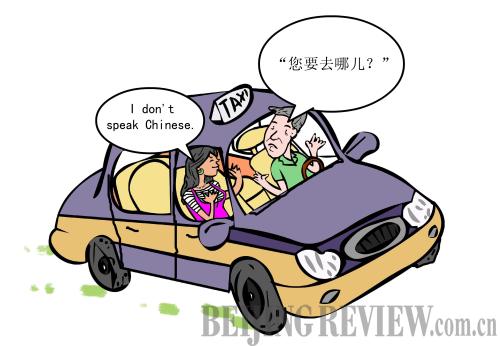|
 |
|
(LI SHIGONG) |
When I was in high school, I went on a family vacation to Ocho Rios, Jamaica. I was getting lunch at a grilled chicken stand, when the cook asked me, "Miss Chin, where are you from?" (Jamaicans use Miss Chin as an affectionate nickname for all Chinese women.) I answered, "I'm from New Jersey, but I'm Korean." He practically dropped his spatula. "Whaaaat? I never met Korean Japanese Miss Chin from New Jersey!" he shouted. That was the only time I've had someone think I was Korean, Japanese and Chinese all at once, but confusion about Asian ethnicities was generally a recurring theme for my childhood in America. It wasn't uncommon for people, upon hearing that I was Korean, to smile and say, "Cool! I love sushi," or "ni hao!"
I thought this confusion would end once I moved to Asia. After all, Asians should be able to discern Asians from one another, right? But when I visited South Korea, I found myself occasionally mistaken for a Chinese tourist. At a cellphone store, when I didn't know how to say the word "charger" in Korean, the attendant asked me in Korean, "Are you Chinese?" and I answered in Korean, "No, I am Korean." Then he said in English, "Are you from China?" and I laughed and said in English, "No! I'm Korean and I'm from America."
But it got worse when I moved to China. Local Beijingers could not wrap their heads around that I was not Chinese in any way, shape or form. On a recent cab ride, after hearing my accent, the driver said to me, "You're not from Beijing. Where are you from?" I said, "I'm Korean." He screeched the car to a halt. "Let me see your face," he said, turning on the light. "You definitely look Chinese! One of your parents must be Chinese." I explained that I was 100-percent Korean. Even so, he said, "You must have some Chinese blood in there somewhere. You know, if you don't open your mouth, nobody would believe you weren't Chinese."
These days, I tell people I'm Korean, but actually, I consider myself American. I find that this is truly an impossible concept to express to most Chinese people. In the beginning, I used to say I was American, and they'd respond, "You mean you're Chinese and you live in America," and I'd say, "No, I'm Korean-American." This often led to the other person saying, "Well, you're not really American then, you're Korean." Now I just immediately tell everyone I'm Korean to cut down on the confusion.
Living in China and wearing the face of a Chinese person without the language fluency or cultural background is a very strange experience. Of course, there are plenty of Chinese-Americans or Chinese-Canadians who speak poor Mandarin, but unlike myself, they have a deep connection rooted in China through their ancestors. I'm just an American girl from New Jersey trying to practice Chinese and have adventures abroad, yet every day I'm treated like a Chinese person. Locals speak to me in rapid-fire Mandarin, and when I'm out with Western friends who are sometimes much better than I am at speaking Chinese, waiters will only address me because they assume I am the interpreter for my friends. I often feel embarrassed when I run into language hiccups, which is often, because people stare at me so strangely. "This girl was born and raised in China," they must think to themselves, "How is it that she still can't speak Chinese? What is wrong with her?"
But sometimes it's a relief to blend in so easily. For my fellow laowais in Beijing who are white or black, it has become normal to begrudgingly take photos with Chinese tourists who have never seen a foreigner. They're also used to Chinese people inviting them to be their language partners. This is all harmless, but on the dark side of things, scammers will try to cheat them out of extra cab fares or charge them 300 yuan ($48) for one beer. Thankfully, I only get scammed as often as an average Chinese person.
Because I look Chinese, I am held to a different set of expectations. For example, whereas many of my foreigner friends might wear a very low cut blouse, I fear the disapproving stares of Chinese ayis and dress more modestly in China than I would in the United States. In small ways like these, I find myself subconsciously taking on Chinese habits and blending in even more. I know, certainly, that even when they know I'm a Korean-American born and raised in New Jersey, Chinese people will never see me as a true foreigner. And it means that the cultural barrier is smaller, because I can tell that local people are more at ease when they speak with me, and less nervous about speaking good English or giving China face in front of me. When non-Asian foreigners say, "ni hao," Chinese people marvel at their Chinese skills. When I speak in Chinese, I get scolded. "But I'm Korean!" I protested once to a cab driver. He shook his head. "You ought to be better at Chinese," he said.
At the hair salon, the hairstylist said to me, "Do you go back to South Korea often?" and I said, "No, almost never. All of my family is in America. I was born there." She laughed and shook her head. "A Korean girl, born and raised in America, living in China," she said. "Now that's funny."
The author is an American living in Beijing |
